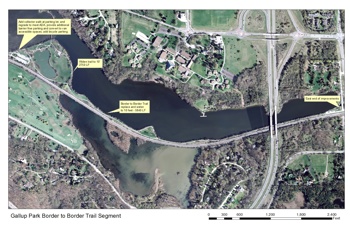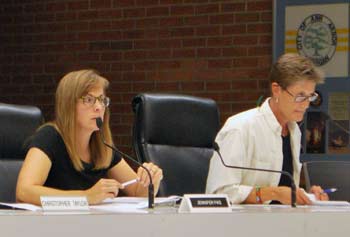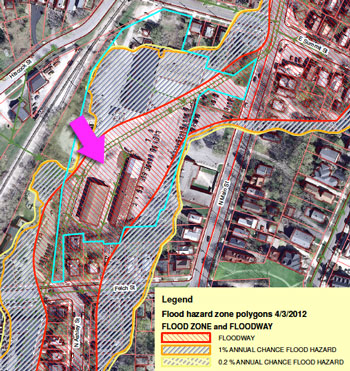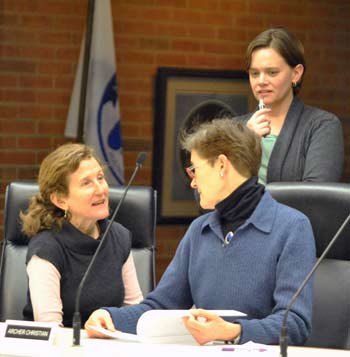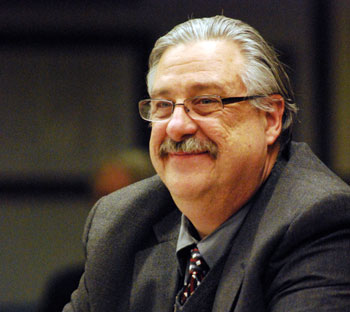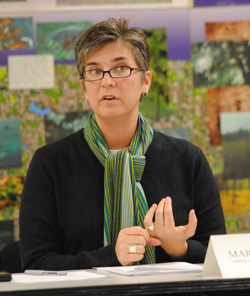Washtenaw County board of commissioners meeting (Jan. 16, 2013): Washtenaw County government will be working to erase a projected $24.64 million general fund deficit over a four-year period from 2014 through 2017. County administrator Verna McDaniel and her financial staff gave a budget briefing to county commissioners at their Jan. 16 meeting.
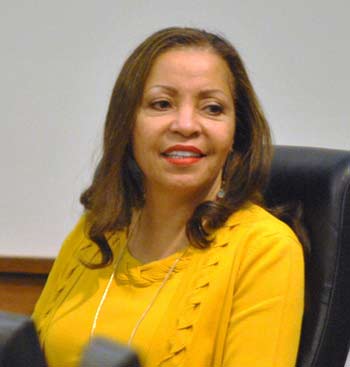
Washtenaw County administrator Verna McDaniel gave a budget update to commissioners at their Jan. 16, 2013 meeting. (Photos by the writer.)
Although a much smaller general fund deficit of $3.93 million is projected for 2014, McDaniel hopes to make $6.88 million in structural changes that year – a combination of new revenues and cuts in expenditures. If that happens, “we’d be done – we’d have no deficit” going forward, McDaniel said, because those cuts and revenue increases would compound and carry over into future years.
To do that, for 2014 the goal is to generate an additional $1.2 million in revenue, reduce operating costs by $2.96 million, cut $100,000 from outside agency funding, and find $2.62 million in reductions to employee compensation and benefits.
McDaniel noted that for 2012-2013, the county overcame a $17.5 million deficit – but only about $7.3 million of that came from structural changes. Yousef Rabhi, the board’s chair, noted that even though the $6.88 million target is lower, the cuts will be a challenge because many services are already cut to a minimal level.
The board has set a planning retreat for Thursday, March 7 at 6 p.m. – to be held during its regular working session – to talk about budget priorities.
In other action at the Jan. 16 meeting, commissioners were appointed to more than 40 boards, commissions and committees. [.pdf of 2013 appointments listing] Because of changes approved late last year, commissioners will receive stipends based on the number of groups on which they serve, and the number of meetings that they are expected to attend.
Though there are still some details to be determined, a tentative tally of stipends shows a total of $8,800 for all nine commissioners, with individual pay ranging from a low of $0 for Ronnie Peterson, the only commissioner with no appointments, to $2,700 for Yousef Rabhi, whose appointments include several that are mandatory because of his position as board chair.
Unlike the previous per diem system – when commissioners had to request payments, which were administered by the county clerk’s office – the stipend payments will be pro-rated, aggregated and paid out biweekly as part of a commissioner’s paycheck. No one is responsible for monitoring attendance, and absences will only be addressed if brought to the attention of the board chair.
During the Jan. 16 meeting, commissioners also approved a variety of federal grants, primarily related to funding for homeland security and job training. And given initial approval was an application for a $20,000 grant to fund expansion of an after-school program called “Telling It” in the West Willow and MacArthur Boulevard housing developments – low-income neighborhoods on the east side of Washtenaw County.
The grant application is unusual in that it’s the first time a county unit – in this case, the sheriff’s office – has sought funding through the coordinated funding pilot program, which was designed to support human services more effectively in this community. The coordinated funding is a partnership of Washtenaw County, the city of Ann Arbor, the United Way of Washtenaw County, the Washtenaw Urban County, and the Ann Arbor Area Community Foundation. [Full Story]




